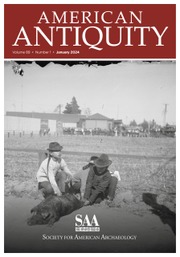Crossref Citations
This article has been cited by the following publications. This list is generated based on data provided by Crossref.
Thompson, Barry E.
1979.
Contemporary Perspectives in South Asian Archaeology: The Prehistory and Protohistory of India and Pakistan. H. D. Sankalia.: New Archaeology: Its Scope and Application to India. H. D. Sankalia.: Understanding Indian Civilization: A Framework of Enquiry. S. C. Malik..
American Anthropologist,
Vol. 81,
Issue. 1,
p.
75.
Dunnell, Robert C.
and
Wenke, Robert J.
1980.
Cultural and Scientific Evolution: Some Comments on “The Decline and Rise of Mesopotamian Civilization”.
American Antiquity,
Vol. 45,
Issue. 3,
p.
605.
Salmon, Merrilee H.
1980.
Reply to Lowe and Barth.
American Antiquity,
Vol. 45,
Issue. 3,
p.
575.
Lowe, John W. G.
and
Barth, Robert J.
1980.
Systems in Archaeology: A Comment on Salmon.
American Antiquity,
Vol. 45,
Issue. 3,
p.
568.
GLADFELTER, BRUCE G.
1981.
Advances in Archaeological Method and Theory.
p.
343.
Schiffer, Michael B.
1981.
Some Issues in the Philosophy of Archaeology.
American Antiquity,
Vol. 46,
Issue. 4,
p.
899.
CHARLTON, THOMAS H.
1981.
Advances in Archaeological Method and Theory.
p.
129.
WENKE, ROBERT J.
1981.
Advances in Archaeological Method and Theory.
p.
79.
1982.
Philosophy and Archaeology.
p.
183.
Bamforth, Douglas B.
and
Spaulding, Albert C.
1982.
Human behavior, explanation, archaeology, history, and science.
Journal of Anthropological Archaeology,
Vol. 1,
Issue. 2,
p.
179.
MCGUIRE, RANDALL H.
1983.
Advances in Archaeological Method and Theory.
p.
91.
Dunnell, Robert C
1984.
Methodological Issues in Contemporary Americanist Archaeology.
PSA: Proceedings of the Biennial Meeting of the Philosophy of Science Association,
Vol. 1984,
Issue. 2,
p.
716.
Lourandos, Harry
1984.
Changing perspectives in Australian prehistory: a reply to Beaton.
Archaeology in Oceania,
Vol. 19,
Issue. 1,
p.
29.
HODDER, IAN
1985.
Advances in Archaeological Method and Theory.
p.
1.
Marks, J.
and
Staski, E.
1988.
Individuals and the evolution of biological and cultural systems.
Human Evolution,
Vol. 3,
Issue. 3,
p.
147.
Brumfiel, Elizabeth M.
1992.
Distinguished Lecture in Archeology: Breaking and Entering the Ecosystem—Gender, Class, and Faction Steal the Show.
American Anthropologist,
Vol. 94,
Issue. 3,
p.
551.
Morrison, Kathleen D.
1994.
The intensification of production: Archaeological approaches.
Journal of Archaeological Method and Theory,
Vol. 1,
Issue. 2,
p.
111.
Bamforth, Douglas B.
2002.
Evidence and Metaphor in Evolutionary Archaeology.
American Antiquity,
Vol. 67,
Issue. 3,
p.
435.
Yoffee, Norman
2005.
Myths of the Archaic State.
Lyman, R. Lee
2007.
What is the `process' in cultural process and in processual archaeology?.
Anthropological Theory,
Vol. 7,
Issue. 2,
p.
217.




